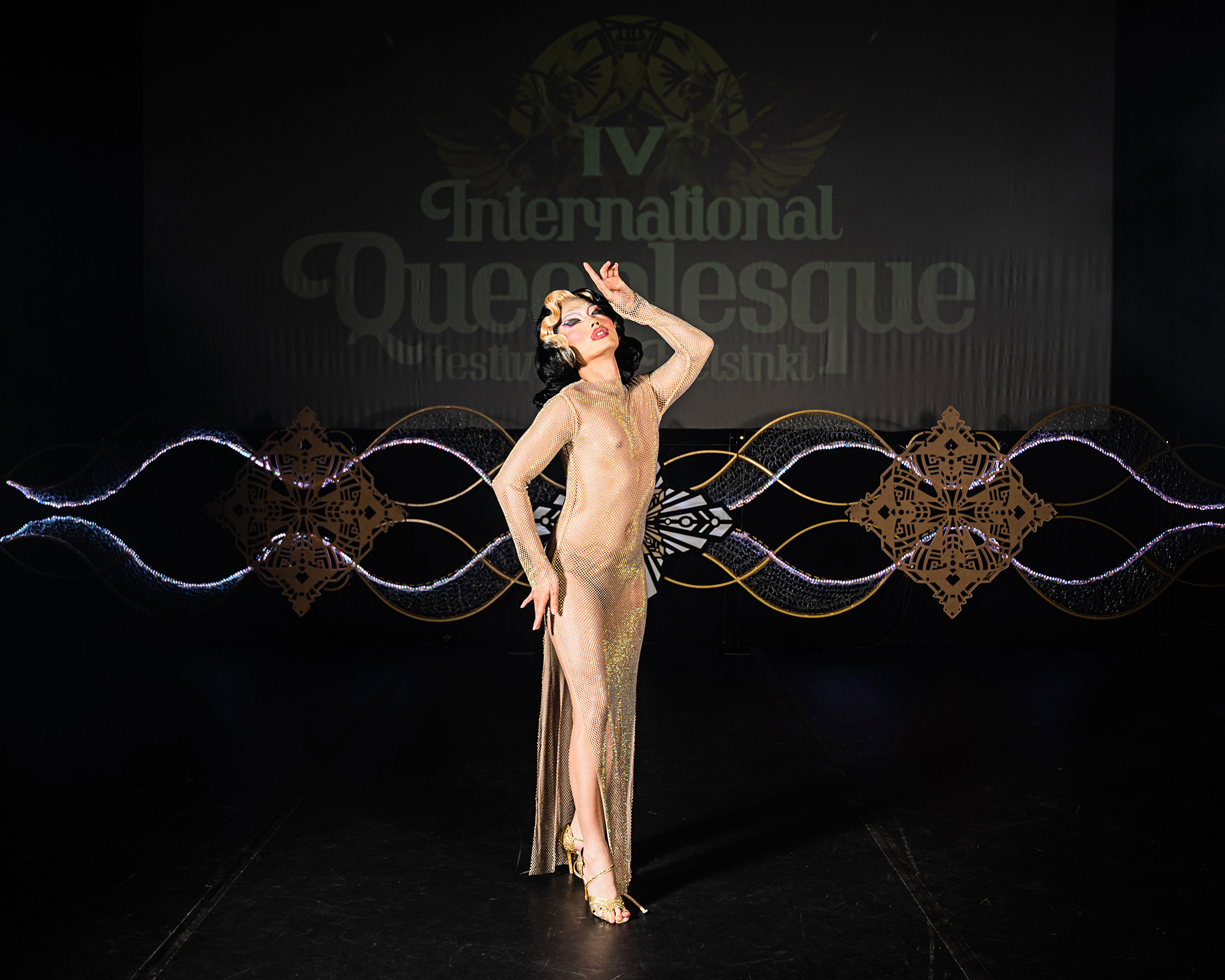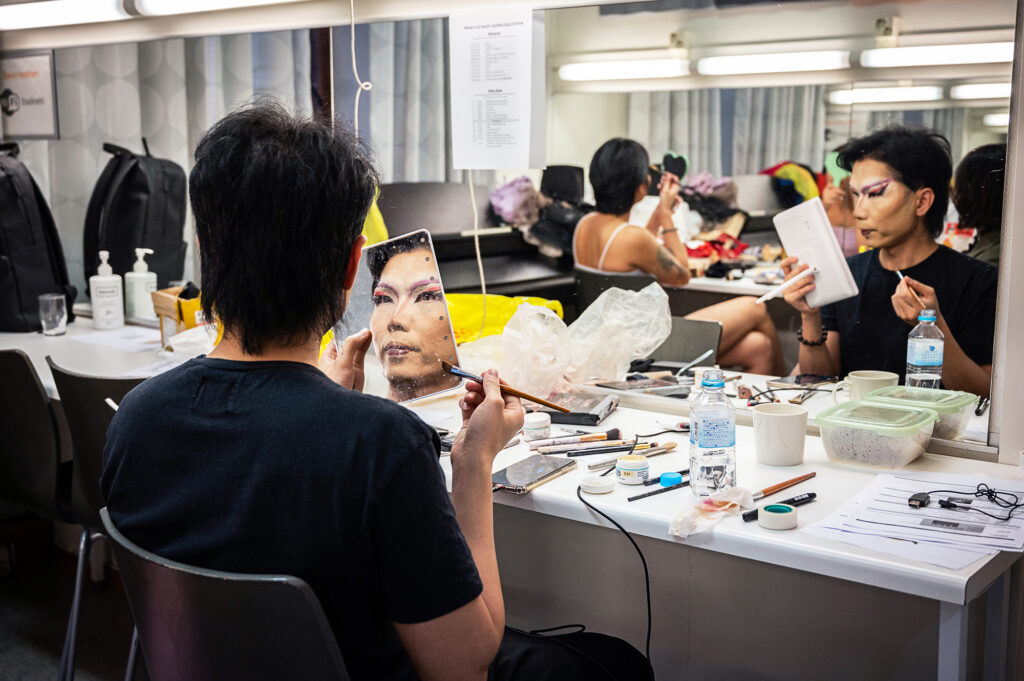Finland’s first drag parliamentary candidate is concerned about current atmosphere – “There is too much racism and homophobia”

Now Phuong Dao focuses on creating safe spaces for the LGBTQ+ community, like the Queerlesque festival.
Flor Salazar Martinez
Sercan Alkan
Published 22.10.2024 at 3:19
In 2023, Betty Fvck ran for parliament. The drag artist participated in the election as a candidate for the Swedish People’s Party (RKP) with the slogan “Betty for equality”. It was probably the first time such a campaign, with full drag make-up in every campaign material, was seen in a Finnish general election.
Betty Fvck is the show persona of Phuong Dao. For him, a Vietnamese-born Finnish citizen, running a campaign in drag was a conscious statement.
“I believe drag is a platform that allows you to advocate, support and help the community,” he says.
“If a person sees a face like mine, a person of colour from a minority group, being a candidate for the parliamentary elections they will believe that they can also do it.”
In the end, Betty got 220 votes from the Helsinki electoral district, not enough for a seat in the parliament. Dao had known from the start that it is very rare to be elected on the first attempt. Still, he feels that he did not get totally fair chance.
“When it comes to politics, mainstream media in Finland are extremely conservative,” he says.
“They only support certain styles of politicians and group them in boxes by their characteristics. I did not fit in any of their boxes.”
Drag was a way to witness the problems of the community
Phuong Dao moved to Finland in 2010 to pursue a bachelor’s degree in marketing. He arrived as a student with limited resources and focused on studying. Over time he was able to travel around Europe to discover how LGBTQ+ communities express themselves.
Dao fell in love with the art of drag during a trip to New York in 2016. While exploring gay bars around the city, he saw that the culture was very different from what he has used to.
“I was fascinated by the vibrant queer scene in New York. That was something I felt was missing out here at the time. For example, drag shows were not that common in Helsinki.”
After the trip, Phong was motivated to craft a character he could use and signed up for a drag competition. He won the competition, and his new career skyrocketed. The show persona, Betty Fvck, was born.
During the years that followed, Dao witnessed the problems his community faced firsthand. There was a lack of clarity for trans rights and limitations in gay marriage, adoption rights and workplace inclusion.
Dao felt the urge to try to do something. In the end, he concluded that the answer was to take part of the political process himself.
Minority representation in politics is still a problem to some
Joining a political party was fairly easy, Dao recalls. The RKP welcomed him happily. The party was willing to help with legal guidelines and other practical issues, such as communicating in English due to Dao’s limited knowledge of Finnish. All his political proposals were translated by the party to Finnish and Swedish.
The campaign itself left Dao with also grimmer memories.
During the election process, he received a lot of hateful comments in social media, most of them being homophobic. He had expected some kind of consequences for the public exposure, but the experience was more traumatic than he had anticipated.
“The comments were terrible and difficult to cope with, because they did not attack my professionalism, but my private life,” he says.
After the election day, he felt relieved despite not getting elected. The contest had taken a high psychological toll on him. He thinks that his experience shows that when it comes to gender expression in politics, there still are barriers.
“If I ever do it again, I know I need a stronger support network to back me up.”
Representation through a festival
Phong Dao still thinks that it is vital that people in Finland with different backgrounds get involved in local politics. That is how individuals can influence issues.
Nevertheless, Dao himself is not running in the 2025 local elections. His focus is on his PhD in marketing at the Hanken School of Economics.
Betty Fvck will remain around, Dao says. She has professional ambitions to fulfil.
In 2020, during the Covid-19 pandemic, Dao and his team created a festival called Queerlesque. It was meant to be a place for artists with different backgrounds to showcase their talents.
This year, the event was held for the fourth time in the beginning of October, at the Savoy Theater in Helsinki.

The changes in immigration policies and the grim economic situation in Finland cast their shadow also over Queerlesque. Dao and his team have tried to help by employing English speakers, refugees and people of colour in their staff. They also provided a “pay what you can” policy for the tickets to make the event accessible to as many as possible.
But there’s only so much one event and limited amount of people can do.
“I know from many fellows, who are struggling financially,” Dao says. “There is too much racism, and homophobia against minority groups.”
Key insights about drag performance
— “Drag” is an artistic performance that uses gender stereotypes to highlight problems in society. It is characterised for using extravagant makeup and exaggerated clothing.
— There are Drag Queens (male impersonating a female), Drag kings (female impersonating a male).
— Each performer crafts the character based on the fantasy they want to project or the issue they want to highlight. Sexual and gender orientation do not limit the type of performance the artist wants to deliver.
— Crossdressing as a form of entertainment has been seen in many countries throughout decades. In Shakespearean theatre there were no female performers. In Russia, France and Germany there are antecedents of Crossdressing balls.
— Contemporary drag is heavily influenced by the African American and Latino LGBTQ community in America that after being marginalised and racialized, created the BallRoom scene as an space for free expression.